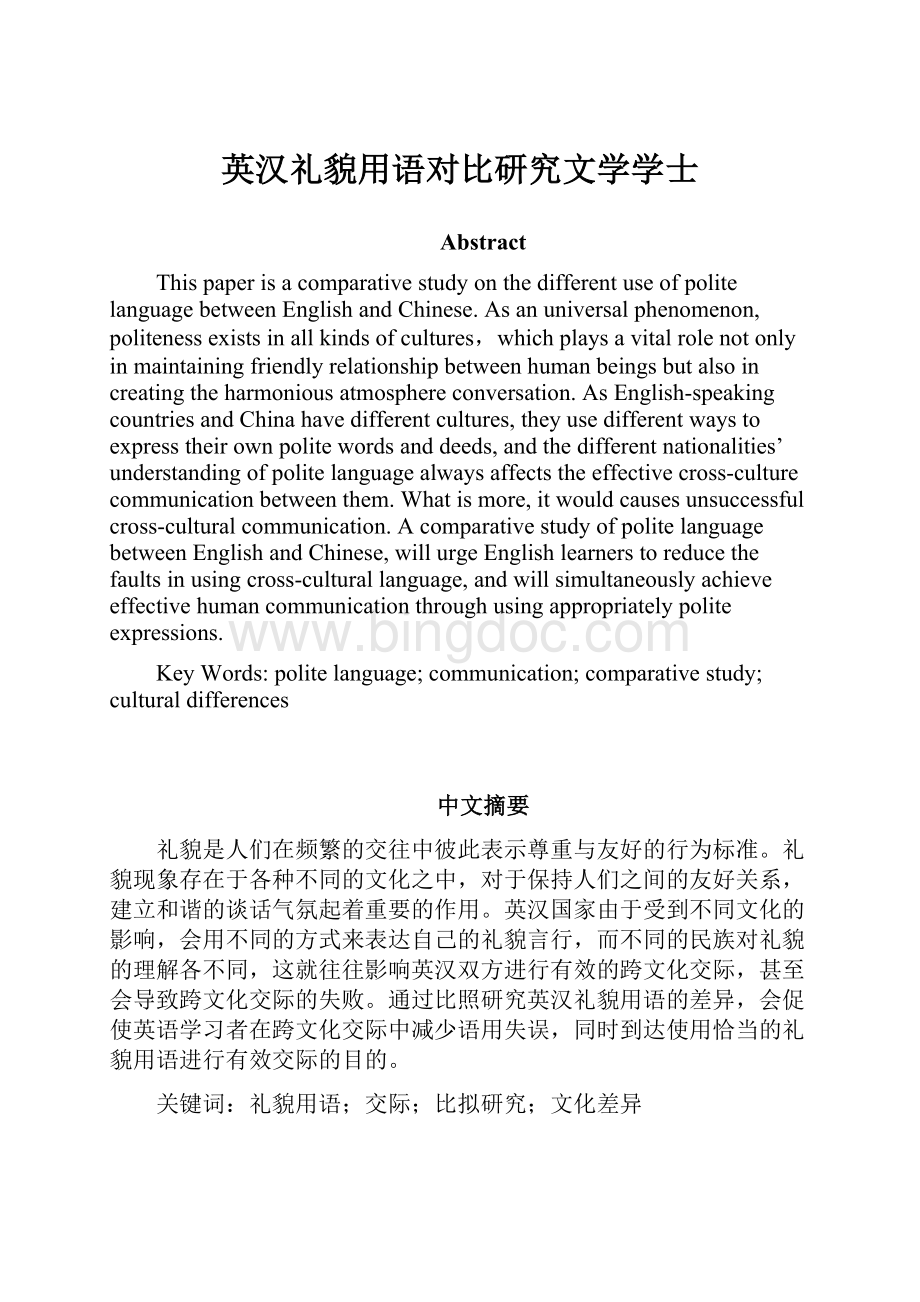英汉礼貌用语对比研究文学学士.docx
《英汉礼貌用语对比研究文学学士.docx》由会员分享,可在线阅读,更多相关《英汉礼貌用语对比研究文学学士.docx(13页珍藏版)》请在冰点文库上搜索。

英汉礼貌用语对比研究文学学士
Abstract
ThispaperisacomparativestudyonthedifferentuseofpolitelanguagebetweenEnglishandChinese.Asanuniversalphenomenon,politenessexistsinallkindsofcultures,whichplaysavitalrolenotonlyinmaintainingfriendlyrelationshipbetweenhumanbeingsbutalsoincreatingtheharmoniousatmosphereconversation.AsEnglish-speakingcountriesandChinahavedifferentcultures,theyusedifferentwaystoexpresstheirownpolitewordsanddeeds,andthedifferentnationalities’understandingofpolitelanguagealwaysaffectstheeffectivecross-culturecommunicationbetweenthem.Whatismore,itwouldcausesunsuccessfulcross-culturalcommunication.AcomparativestudyofpolitelanguagebetweenEnglishandChinese,willurgeEnglishlearnerstoreducethefaultsinusingcross-culturallanguage,andwillsimultaneouslyachieveeffectivehumancommunicationthroughusingappropriatelypoliteexpressions.
KeyWords:
politelanguage;communication;comparativestudy;culturaldifferences
中文摘要
礼貌是人们在频繁的交往中彼此表示尊重与友好的行为标准。
礼貌现象存在于各种不同的文化之中,对于保持人们之间的友好关系,建立和谐的谈话气氛起着重要的作用。
英汉国家由于受到不同文化的影响,会用不同的方式来表达自己的礼貌言行,而不同的民族对礼貌的理解各不同,这就往往影响英汉双方进行有效的跨文化交际,甚至会导致跨文化交际的失败。
通过比照研究英汉礼貌用语的差异,会促使英语学习者在跨文化交际中减少语用失误,同时到达使用恰当的礼貌用语进行有效交际的目的。
关键词:
礼貌用语;交际;比拟研究;文化差异
Contents
1.Introduction
1.1Background
StudiesoncomparativestudyofpolitelanguagebetweenEnglishandChinesehavegaingreatattentionathomeandabroad,andthuslargequantitiesofliteratureonthestudyoflearningcomparativestudyofpolitelanguagebetweenEnglishandChinesewerepublished.Themainfunctionofpolitenessexpressionsistoestablishandmaintaingoodinterpersonalrelationships.DuetothedifferentculturebetweenEnglishandChinese,thepolitelanguageisquitedifferent.Contemporary,Englishhasbeenasanimportantinternationallanguage.AstheeconomicdevelopingveryfastinChina,it’sinternationalpositionismoreandmoreimportantaswell.SowhetheritisforEnglishlearnersorforeigners,interculturalcommunicationbecomesmoreandmoreimportant.Inordertoavoidtheverbalmisunderstandingandfailureincommunication,ensuresmoothcommunication,peopleshouldlearnthedifferencespolitelanguagebetweenEnglishandChinese.
1.2Aimandobjectives
ThisstudyaimstofindoutthedifferencesofpolitelanguagebetweenEnglishandChineseinordertoavoidverbalmisunderstandingandfailureincommunication.ThispapertriestoanalyzetheculturaldifferencesaffectthepolitelanguageinEnglishandChinese,andpointsoutthatthecomparativestudywillhelpustoreducethepragmaticfailureandachievethecross-culturalcommunication.
Tobespecific,thisstudyattemptstoanswerthefollowingthreequestions:
(1)Whatisthepurposetoanalyzethisstudy?
(2)WhatcausesthedifferencesofpolitelanguagebetweenEnglishandChinese?
(3)Whatshouldwelearnduringthisstudy?
1.3Organizationofthepaper
Thispaperisdividedintofivechapters.Chapteroneservesasanoverallintroductiontotherationaleandaimofthestudy.Chaptertworeviewsthedefinitionsofpolitenessthathavebeenproposedbyscholarsathomeandabroad.Chapterthreeanalyzesthedifferencesinaddressing,greeting,inviting,andapologizingandthankingbycomparison.Chapterfouranalyzesthespecificculturalassumptions,andputforwardsuggestionsonhowtoimprovethecross-culturalcommunication.ChapterfiveisdevotedtotheconclusioninwhichwefindoutthedifferencesofpolitelanguagebetweenEnglishandChineseinordertoimprovethecross-culturalcommunication.
2.LiteratureReview
Politeness,inaninteraction,canthenbedefinedasthemeansemployedtoshowawarenessofanotherpeople’sface.(GeorgeYule,2004,10:
60)
Intheearly50s,theAmericanscholarE.Goftmanhadputforwardthe“facebehaviortheory〞intermsofsociology.BrownandLevinson〔1978〕viewpolitenessas“acomplexsystemforsofteningface-threateningacts.〞OnthebasisofthetheoryofEGoftman’s,in1978,BrownandLevinsonhaveputforwardthemature“facebehaviortheory〞intheirbook‘UniversalsinLanguageusagepolitenessphenomena’.Andtheytriedtoregard“facebehaviortheory〞asacommonlinguisticphenomenontostudy.
Asfaras1702,Theophrastusdefinedpolitenessas“asocialbehavior;askilltobeusedtoachieveaspecificaim,theprincipalaimisenhancementofego’sself-esteemandhis/herpublicstatusinhereyesofotherswithsupplementaryaimofenhancingothers’self-esteem.(Watts,1992)
AccordingtoOxfordAdvancedLearner’sDictionaryofCurrentEnglish(1980),politenessmeanstheattempttoestablish,maintainandsavefaceduringconversation.
Lakoff(1973)holdstheviewthatpolitenessisadeviceusedinordertoreducefrictioninpersonalinteraction.
Leech(1983)interpretspolitenessasformofbehavioraimedattheestablishmentandmaintenanceofcomity,i.e.,theabilityofParticipantsinasocio-communicativeinteractiontoengageininteractioninanatmosphereofrelativeharmony.Furthermore,Leechputforwardsixpolitenessprinciplestorestrictinterpersonalcommunication.ThefirstoneisTactMaxim(得体准那么):
(a)Minimizecosttoother(尽量少让别人吃亏),(b)Maximizebenefittoother(尽量多使别人受益).ThesecondoneisGenerosityMaxim(慷慨准那么):
(a)Minimizebenefittoself(尽量少让自己受益),(b)Maximizecosttoself(尽量多使自己吃亏).ThethirdoneisApprobationMaxim(赞誉准那么):
(a)Minimizedispraiseofother(尽量少贬低别人);〔b〕Maximizepraiseofother(尽量多赞誉别人).ThefourthoneisModestyMaxim(谦虚准那么):
(a)Minimizepraiseofself(尽量少赞誉自己);〔b〕Maximizedispraiseofself(尽量多贬低自己).ThefifthoneisAgreementMaxim(一致准那么):
(a)Minimizedisagreementbetweenselfandother(尽量减少双方的分歧);〔b〕Maximizeagreementbetweenselfandother(尽量增加双方的一致).ThelastoneisSympathyMaxim(同情准那么):
(a)Minimizeantipathybetweenselfandother(尽量减少双方的反感);〔b〕Maximizesympathybetweenselfandother(尽量增加双方的同情).〔Leech,1983〕
Grundy(1995)considerpolitenessas“thetermweusetoextenttowhichactions,thewaythingsaresaid,matchaddresseesperceptionsofhowtheyshouldbeperformed.〞
Kasper(1990)viewthat“Politenessisthereforeatermtorefertothestrategiesavailabletointeractionstodefusethedangerandtominimizetheantagonism.〞
House(2001)sayspolitenessisasocio-culturalphenomenon,roughlytobedefinedasshowing,orappearingtoshow,considerationtoother.
InChina,theconceptofpolitenesscanbetracedbackofthenotionto礼〔rite〕.ItreferstothesocialhierarchyandorderoftheslavesocietyoftheZhouDynasty(He,1995).Twoorthreehundredslater,thenotionof礼gainedthemeaningofpoliteness.In?
礼记?
(theBookofRites),whichisoneofthesixConfucianclassiccompliedbyDaiSheng(辞海,1979),theclassicalnotionof礼wasdescriedas“tohumbleyourselfbutshowrespecttoother.〞ProfessorGu(1990)fromBeijingInternationalStudiesUniversityputsitthattherearebasicallyfournotionsunderlyingtheconceptionof礼貌.Therearerespectfulness,whichreferstoself’spositiveappreciationoradmirationofotherconcerningface,socialstatusandsoon;modesty,whichisawaytoshowself-denigration;attitudinalwarmth,whichinvolvesself’sdemonstrationofkindness,considerationandhospitalitytoother;andrefinement,whichreferstoself’sbehaviortootherwhichmeetscertainstandards.ThesearethekeycomponentsofChineseconceptofpoliteness.
3.AComparativeStudyofPoliteLanguagebetweenEnglishandChinese
3.1Addressingform
Differentaddressingformsinrelations
Accordingtomoderndictionary,termsofaddressexplainlikethis:
Termofaddressisthetitletellingtheinterrelationbetweenoneandtheother,aswellasrepresenttheother’sstatusorcareer.
Fromancienttimestopresent,ChinesehavepaidmuchattentiontoaddressingotherduetoChinaisacountrywithlonghistory,andtheyrespecttheeldersverymuch.InChinese,thejuniorshouldn’taddresstheeldersbytheirnamedirectlybutusetherelativeaddresses,suchas“爷爷〞(grandpa),“奶奶〞〔grandma〕,“爸爸〞(dad),“妈妈〞(mum),andsoon.Amongthepeers,theyoungershouldnotcalltheeldersbytheirfullnamedirectlybutaddressthembyusingtherelativeaddresses,suchas“大哥〞〔elderbrother〕,“大姐〞(eldersister),whiletheeldercancalltheyoungerbytheirnamedirectly.
ComparedwithChinese,termsofaddressinginEnglisharemuchsimpler.Theyaddressalltheirfather’sandmother’sbrother“uncle〞,alltheirfather’sandmother’ssister“aunt〞andcallalltheirpeers“cousin〞.However,inChinese,itisverycomplex.Suchas“舅舅〞(mother’sbrother);“伯父〞〔father’selderbrother〕;“叔父〞(father’syoungerbrother);“姨父〞(husbandofmother’ssister);“姑父〞(husbandoffather’ssister);“姨妈〞(mother’smarriedsister);“姑妈〞(father’smarriedsister);“堂兄弟〞(sonsoffather’sbrother)“堂姐妹〞(daughtersoffather’sbrother)“表兄弟〞(sonsoffather’ssisterorofmother’ssisterorbrother)“表姐妹〞(daughtersoffather’ssisterorofmother’ssisterorbrother).InEnglish,theycancalltheirnamesamongpeers,evenbetweentheirparents.ItisquitedifferentinEnglishandChinese.
Differentaddressingformsinsocialoccasion
InChina'sformaloccasions,peopleprefertousepostcall,suchas:
ministerWang,directorLi,managerZhang,etc.Ononehand,tobecalledreflectedtherespect,ontheotherhandalsoreflectedthestatusoftheidentity.However,inEngland,betweencolleagues,betweensuperiorsandtheirsubordinatesoftencalleachotherbyname,generallynotwiththetitleoftitlessuchasManagerSmithtoshowcordialityorshortenthedistancebetweenthetwosides.Especiallyinrecentyears,thewesternsocialcommunicationofthe"address"seemstobegoingthrougharevolution,regardlessofpositionandpositionis,peoplearemo